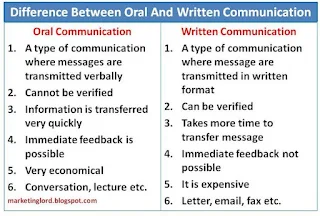The key differences between oral and written communication are as follows:
1. Transmission Type
Oral Communication: In oral or verbal communication, messages or opinions are exchanged or transmitted verbally (spoken words.)
Written Communication: In written communication, messages or information are transmitted in written format.
Oral Communication: It cannot be verified because there is no record of verbal communication.
Oral Communication: Information are exchanged very fast in oral communication.
Oral Communication: Literacy is not required for verbal communication.
2.Verification
Oral Communication: It cannot be verified because there is no record of verbal communication.
Written Communication: It can be easily verified because there is proper record of written communication.
3. Speed
Oral Communication: Information are exchanged very fast in oral communication.
Written Communication: It takes more time for the transmission of message.
4. Literacy
Oral Communication: Literacy is not required for verbal communication.
Written Communication: Literacy is very important in written communication.
5. Feedback
Oral Communication: Immediate feedback is possible in verbal or oral communication.
Oral Communication: It is very economical.
Oral Communication: Revision of message before delivering is not possible in oral communication.
Oral Communication: Verbal communication is useful when recipient is near.
5. Feedback
Oral Communication: Immediate feedback is possible in verbal or oral communication.
Written Communication: Immediate feedback is not possible in written communication. It takes some time.
6. Cost
Oral Communication: It is very economical.
Written Communication: It is expensive than verbal communication.
7. Revision Of Message
Oral Communication: Revision of message before delivering is not possible in oral communication.
Written Communication: Revision of message before delivering is possible in written communication.
8. Usefulness
Oral Communication: Verbal communication is useful when recipient is near.
Written Communication: It is useful if the recipient is at distant.
Oral Communication: There is high chance of misunderstanding,
Oral Communication: Verbal or oral communication cannot be used as legal evidence.
Oral Communication: Telephone conversation, lecture, face to face talk etc.
9. Misunderstanding
Oral Communication: There is high chance of misunderstanding,
Written Communication: There is very less chance of misunderstanding in this type of communication.
10. Legal Evidence
Oral Communication: Verbal or oral communication cannot be used as legal evidence.
Written Communication: It can be used as legal evidence if required.
Also Read
11. Examples
Oral Communication: Telephone conversation, lecture, face to face talk etc.
Written Communication: Letter, bulletin, e-mail, fax etc.







